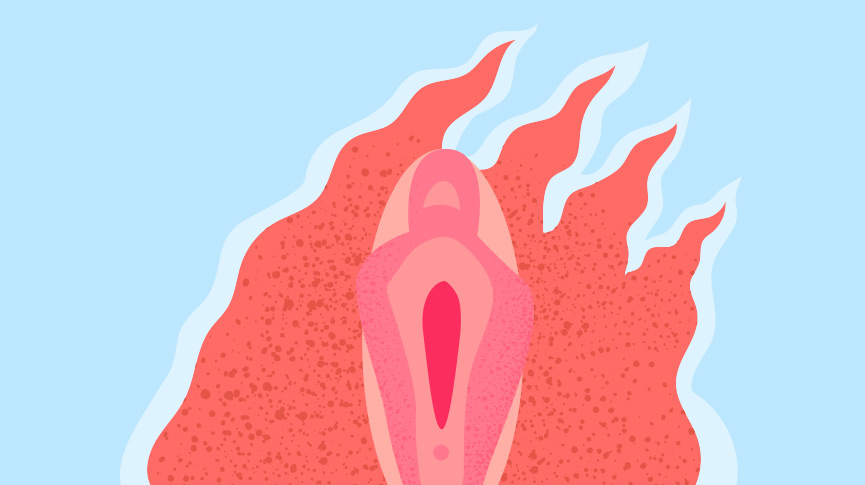Candida and Your Vaginal Health

The vagina and surrounding areas are strong, yet sensitive pieces of equipment. That means many things can throw it off and lead to imbalances like urinary tract infections, sexually transmitted infections, and everyone’s favorite – yeast infections.
You’re most likely familiar with the itchy, burning, irritability that is a yeast infection, but what about the living organisms that are thriving thanks to your discomfort? You know that yeast infections can be caused by things like allergies to scented tampons and spermicidal condoms, but what’s underneath it all?
The main culprit behind yeast infections is a microorganism – a fungus named Candida. Just what is Candida and what is it doing in your vagina? Time to find out!
What is Candida?
Microorganisms in the body outnumber human cells by ten to one, making up about 1-3% of the body’s mass. Many of these bacteria, fungi, and viruses are essential for our health and wellbeing, helping to regulate essential processes like digestion and the immune system.
One of those we’ve already introduced you to is Candida. Candida is a fungus that normally lives inside the body in the mouth, throat, gut, and vagina, as well as on the skin. Like many of the other microorganisms living inside and on us, candida is generally harmless. Too much of a good thing can get a bit out of hand sometimes, which is the case with candida overgrowth.
Candida and Your Body
Like we said, some levels of candida are normal, but overgrowth, however, can lead to a fungal infection known as candidiasis. This is the most common fungal infection a human can have. These infections most often occur if the immune system is compromised or the healthy bacteria levels in your body are disrupted. More severe infections can happen when the fungus grows out of control or if the fungus enters deep into the body such as in the bloodstream or internal organs like the kidney, heart, or brain.
There are some factors that can increase your chance of developing a candida overgrowth including:
- Consuming excessive alcohol
- High amounts of stress
- Antibiotic use
- A diet high in refined carbs and sugar
- A compromised immune system
- Take hormonal birth control pills
- Pregnancy
- Having diabetes
Less serious infections can lead to tiredness and fatigue, difficulties concentrating, oral thrush, sinus infections, digestive issues, joint pain, skin infections, and of course – vaginal infections.
Candida and Your Vaginal Health
Now that you understand the effects that candida overgrowth can have on the body, you might have an idea of how it can affect your vagina. Vaginal candidiasis, also known as vulvovaginal candidiasis or candidal vaginitis is a candida yeast infection in the vagina.
The strain that typically causes vaginal infections is called Candida Albicans. The occasional yeast infection is very common. An estimated 75% of people with a vagina will experience at least one in their lifetime.
You probably don’t need a reminder, but the symptoms of vaginal candidiasis include:
- Discomfort or pain while urinating
- Painful sexual intercourse or contact
- Vaginal soreness or itching
- Abnormal vaginal discharge
- Redness and swelling
- In rare cases, cracks in the wall of the vagina
Vaginal yeast infections are not a sexually transmitted infections, although it’s possible to get one from sexual activities thanks to new bacteria being introduced to the vulva and vagina. On that note, Candida infections aren’t contagious, but it is possible for them to be spread if you happen to have a weakened immune system or take certain medications.
Treating Candida Imbalances
So how do you treat candida infections and imbalances, as well as prevent them from happening in the first place? To determine if a candida infection is present, your healthcare provider may perform a culture test to examine the yeast and bacteria under a microscope, then determine treatment from there.
Vaginal candidiasis is often a reoccurring infection for many people. They might also experience other non-vaginal symptoms of candida overgrowth such as in their gut and cognition. This is why it’s so important to try to treat the underlying reasons behind the infection, and not just the infection itself. If your recurrent yeast infections are due to your hormonal birth control, you may need to try another option, this is something to speak to your gynecologist about. If you have diabetes, it’s imperative to take steps to keep your blood sugar balanced.
Diet plays a huge role in candida overgrowth. You can help support your microbiome and your vaginal health by limiting your intake of alcohol, refined sugar, carbs, and high-lactose dairy products. Certain foods may be beneficial to candida regulation like those high in probiotics such as yogurt and kombucha, garlic, pomegranate, and coconut oil.
Other important lifestyle changes you can make are regulating stress levels, only taking antibiotics as needed and as directed by your healthcare provider, and taking steps to regulate your immune system. Of course, if you do have a yeast infection that you need relief from STAT, there are plenty of over-the-counter antifungal remedies available in most areas to help regulate symptoms fast. There are also natural remedies you can try like using herbal medicine and going commando – aka sans panties.

Natasha (she/her) is a full-spectrum doula and health+wellness copywriter. Her work focuses on deconstructing the shame, stigma, and barriers people carry around birth, sex, health, and beyond, to help people navigate through their lives with more education and empowerment. You can connect with Natasha on IG @natasha.s.weiss.


